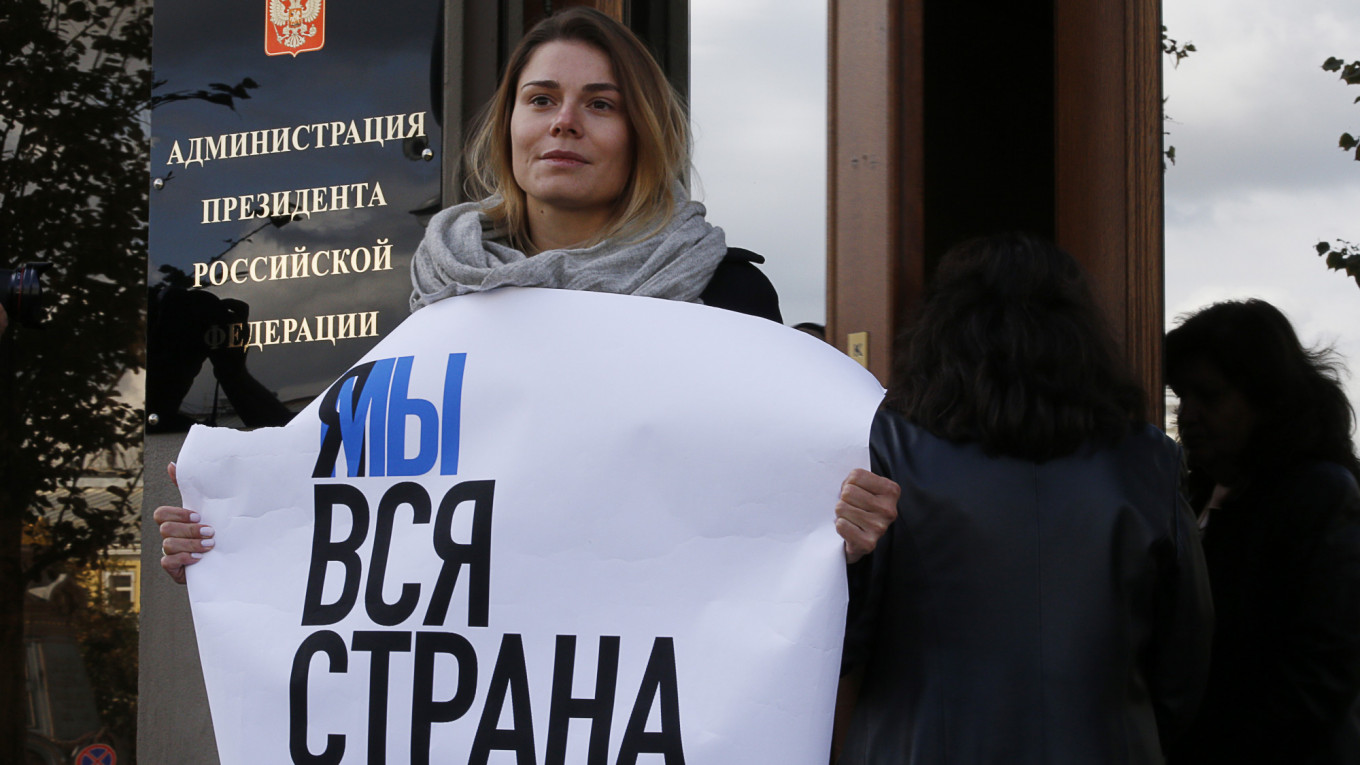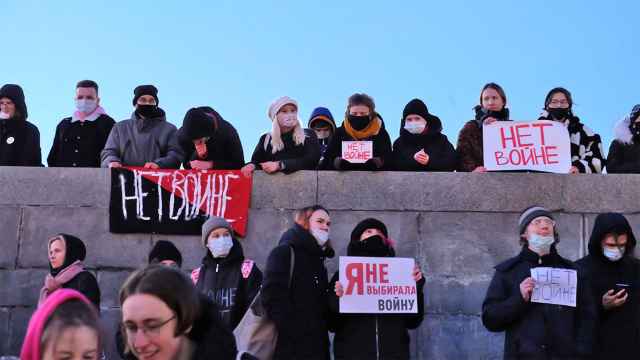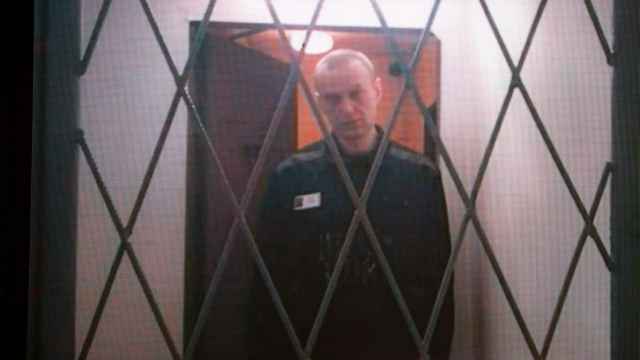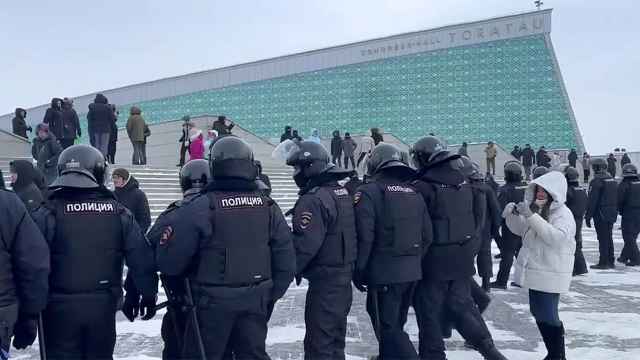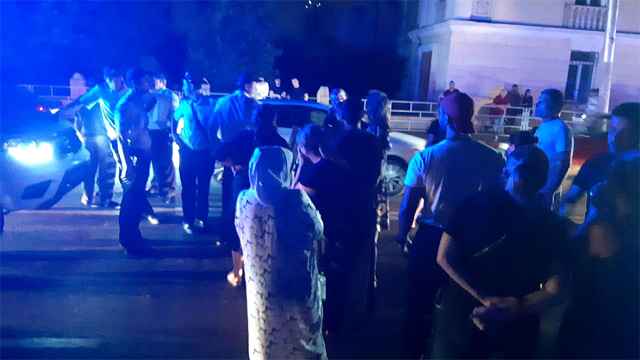Russia is witnessing an unprecedented campaign in defense of individuals imprisoned for taking part in peaceful protest rallies in Moscow.
Teachers, doctors, publishers and even priests have published open letters in their support.
These are the people who keep this country running, and their lives offer the best measure of the state of the country.
A number of actors, outraged over the absurd sentence handed out to fellow thespian Pavel Ustinov, formed a picket line in front of the presidential administration building all day and into the evening on Sept. 18.
Never before in modern Russian history have the people in police uniforms and court robes — long accustomed to deciding other people’s fates — encountered such determined resistance from citizens.
Investigative Committee head Alexander Bastrykin and his cronies thought they could grab all of Russian society by the throat.
They thought that by rounding up the “rabble-rousers” and “fringe elements” in even greater numbers than they did after the Bolotnaya Square protests they could earn themselves a few more commendations, promotions and budget increases.
Instead, they only managed to mobilize entire segments of society against them, people who had previously shown little interest in politics.
The first to arise were students who were under no illusions about the Russian courts. It only took them a matter days to understood that the case against Yegor Zhukov was a sham.
They — not the investigators — were ultimately proven right. Charges that Zhukov had taken part in a riot collapsed even before the case went to trial. Now, Zhukov faces lesser charges of posting extremist content on his blog, but these are simply a face-saving measure from Bastrykin’s investigators.
People have begun asking the students and professors at Zhukov’s place of study, the Higher School of Economics, why they are only talking about him?
Shouldn’t they be demanding the immediate release of all political prisoners?
This is the standard accusation leveled against public campaigns demanding justice for one cause or individual. Journalists were criticized for taking action only when their fellow journalist, Ivan Golunov, was detained on trumped-up drug charges, and not for defending everyone else unfairly imprisoned for the same reason.
Actors who were only interested in the fate of their fellow actor, Ustinov, also came under fire. And so on ad infinitum.
Everyone has heard this criticism, however, I believe it is counterproductive to criticize those who are only willing to defend fellow colleagues or students.
The concept of civil society does not refer to the moral qualities of the individuals comprising it. Not every individual has to be highly principled and concerned about the welfare of all mankind. Civil society is a much more specific phenomenon.
It occurs when a great number of horizontal connections — unfettered by state control — form between a mass of ordinary citizens.
Civil society is much more developed in Germany than in Russia, but not because Germans are constituted differently in a moral sense.
It is because Germans are more involved in the life of society. The average German belongs to a trade union or volunteers at some foundation. Germans participate in the life of their district and attend clubs for runners or stamp collectors. By contrast, the average Russian is skeptical about all such organizations and communicates exclusively with relatives and coworkers — and, more often than not, works for the state.
If a German is convicted of a crime he did not commit, everyone is outraged. His fellow union and party members, as well as his fellow volunteers, neighbors, runners and stamp collectors.
They’ll say, “We know that man and see no evidence that he is guilty. Therefore, we will fight for his freedom.”
This is the strength of civil society.
While the average Russian can only rely on support from his family and a small circle of friends, a well-developed civil society acts en masse to protect its own.
And those actions, in turn, strengthen the wider society even more.
Wherever civic life is rich and diverse, where numerous horizontal connections exist among the members of countless clubs, parties, and like-minded groups, the maxim “all for one and one for all” becomes a reality.
And when people take note of an obvious injustice perpetrated against someone close to them and whom they readily understand, they also begin to notice other injustices around them. This is why “students for students” and “actors for actors” is the best thing that could happen to Russia. This compartmentalized solidarity evolves into a broader civic solidarity.
We shouldn’t expect people to be holy, to speak out in support of an abstract “good” and against an equally abstract “evil.”
Let them first at least stand up for their own. The truth is, we cannot all experience a collective and sweeping sense of injustice, it is easier to support specific cases. So let’s support them.
Daniil Konon, Vlad Barabanov, Valery Kostenok and others who were recently released after facing similar charges to Zhukov, are now attending the court cases of other defendants.
This is probably the most important development of the year. The people being freed are now working to defend others.
A Russian version of this article was originally published by Novaya Gazeta.
A Message from The Moscow Times:
Dear readers,
We are facing unprecedented challenges. Russia's Prosecutor General's Office has designated The Moscow Times as an "undesirable" organization, criminalizing our work and putting our staff at risk of prosecution. This follows our earlier unjust labeling as a "foreign agent."
These actions are direct attempts to silence independent journalism in Russia. The authorities claim our work "discredits the decisions of the Russian leadership." We see things differently: we strive to provide accurate, unbiased reporting on Russia.
We, the journalists of The Moscow Times, refuse to be silenced. But to continue our work, we need your help.
Your support, no matter how small, makes a world of difference. If you can, please support us monthly starting from just $2. It's quick to set up, and every contribution makes a significant impact.
By supporting The Moscow Times, you're defending open, independent journalism in the face of repression. Thank you for standing with us.
Remind me later.



